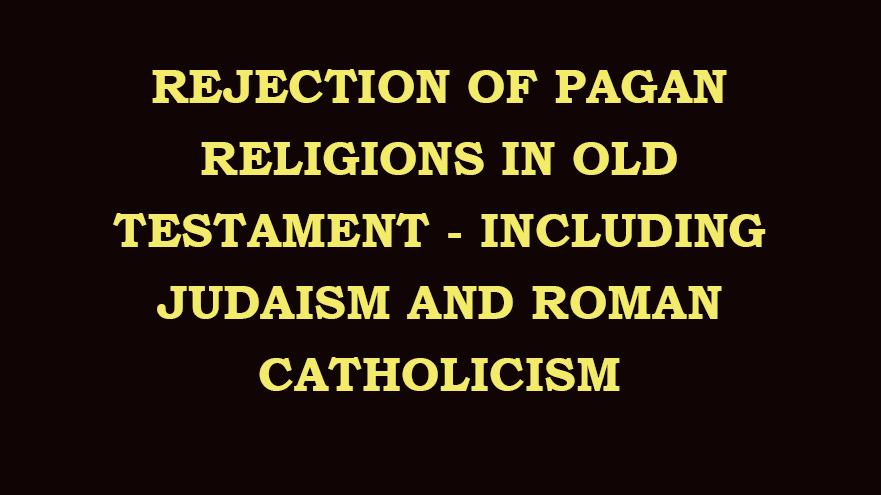
REJECTION OF PAGAN RELIGIONS IN OLD TESTAMENT - INCLUDING JUDAISM AND ROMAN CATHOLICISM
The Lord brought judgment on their gods. The period of wilderness wanderings was formative for Israel as a nation and as people of God. Bible makes severe prohibitions on idolatry, polytheism and practices of pagan worship, sorcery, spiritism, human sacrifice, divination necromancy and other detestable practices (Deut 18:9-14). The lack of moral character of their deities led to such corrupt practices as ritual prostitution, child sacrifice and licentious worship etc. normal expressions of devotion.
The practices of the pagans were in contrast to the high ethical ideals of Israel. Hence there is a universal rejection of pagan religion in the OT dispensation. Israel had clear strictures against unacceptable syncretistic practices. Is it also a rejection of pagan cultures? Religion is the core aspect of the culture. At the heart of culture is a worldview which determines how life is perceived. How far the other cultures are not against the Biblical culture is debatable. When we say that there is no difference between Jesus and other names of gods it becomes syncretistic. It is debatable whether other cultural values are compatible with the Biblical faith. Before the God of Israel, the gods of other nations failed.
PRESENTING CHRIST IN A PLURALISTIC RELIGIOUS SITUATION
The world religions need demythologizing that the preaching of Christ is necessary to dissipate the darkness in them. Christ has set us free from the law of sin and death (Rom 8:2). Christians should announce the kingdom of God - its face and name is Christ. There is no genuine evangelization without discipleship. Exclusive emphasis on humanization loses the full sweep of Gospel. We should opt for proclamation.
JUDGEMENT OF THEIR GODS: IN THE OLD TESTAMENT: The Lord brought judgement on their gods. The period of wilderness wanderings was formative of Israel as a nation and as people of God. Bible makes sever prohibitions on idolatry, polytheism and practices of pagan worship, sorcery, spiritism and related evils, human sacrifice, divination necromancy and other detestable practices (Deut 18:9-14). The lack of moral character of their deities made such corrupt practices as ritual prostitution, child sacrifice and licentious worship normal expressions of devotion. Israel had clear strictures against unacceptable syncretistic practices.
Christians must act in society applying Christian principles to all aspects of life. This will lead to multiplication of believers and churches. Christian proclamation of Christ as the only truth may be incompatible with rival truth claims and can be considered by some as intolerant. In this pluralistic world we should not be afraid of exclusivist claims. Bible contains the exhaustive knowledge about God which man needs to know.
This process theology results in process Christology according to which Jesus was merely human but achieved divine. Resurrection is only the faith experience of the disciples. They want to revamp the mission of the church from evangelism to dialogue. They falsely conclude that the goal of missionary work is to make the people know of Buddha, Krishna and Mohammed and that the goal of conversion is to make the Christian a better Christian, and the Buddhist a better Buddhist. But Christians have the obligation to witness Christ. If Christians are true to Christ, they cannot avoid proclaiming the exclusive claims of Christ. If they do it in the spirit of Christ, they avoid arrogance.
ROLE OF TRUE RELIGION
Today some call for a Practical Spirituality. They falsely conceptualize spirituality as the awareness that ‘spiritual realization is not possible without addressing the concrete problems of the society’. It would be wrong to assume that the chief concern of religion should be self-realization and thereby the creation of a dignified society for all. The record of humanity’s efforts towards self-realization of individuals does not substantiate the claim that such efforts would improve the moral standards of the society.
The emergence of ‘emancipatory and transformative movements within religions to fight against existing structures of indignity and exploitation and attempt to create better world’ is in the final analysis an undesirable development. This is not because the exploitative structures should not be fought against. But because here the religion takes over the role of state and gives up its own responsibility of achieving internal transformation of individuals. It also refers to the failure of the state to fulfill its responsibilities. On the other hand, the purpose of religion should be helping individuals to find out and accept the only true God. The personal and societal transformation is possible only by accepting the true God.
JUDAISM AND ROMAN CATHOLICISM – MOVED AWAY FROM THE BIBLE
JUDAISM: It believes in one true God, but rejects Jesus Christ as the OT promised Messiah and savior. Salvation to them is related to the release and deliverance from physical, political and social bondage for the nation. Salvation is equated to being a Jew and keeping the law. The Jews must ultimately recognize Jesus as the promised OT Messiah. Judaism refers to the religion and culture of the Jewish people. There any many different branches of Judaism today. The term “Jew” originated with lose of the Hebrew people primarily from the tribe of Judah who returned to Israel from the Babylonian Captivity. Abraham was the first Hebrew or Jew. The term “Jew” is generally applied to all Israelites. Christianity uniquely flows out of and traces its heritage to OT Biblical Judaism since salvation is based on the Abrahamic Covenant. Historically and biblically the Jews were God’s chosen instrument of redemption but rejected Jesus Christ as Messiah and collaborated with the Romans to have Him crucified. Acts indicates the Jews tried to destroy Christianity and preserve classic Judaist religion and culture.
Basic beliefs - God. The God of the Jews is Jehovah (Yahweh) of the Old Testament. Scriptures - The Jews generally reject altogether or ignore the New Testament as being for the Gentiles. Jesus Christ - The Jews generally reject Jesus Christ as the promised OT Messiah and Savior. Salvation - To the Jews salvation is related not so much to redemption from forgiveness of sins but to release and deliverance from physical, political and social bondage for the nation. Being born a Jew and keeping the law are means of salvation. Sabbath - day of rest remembering creation and the giving of the law. Passover - memorializing God’s Passover Redemption of Israel from Egypt in the Exodus. Yom Kippur - national and personal confessions and cleansing of sins. Rosh Hashanah - reflect on the past and hope for the future. Hanukkah - commemorate the successful Maccabean revolt to overthrow Antiochus Epiphanes IV in 167 BC and restore temple worship.
ROMAN CATHOLICISM: many of the Roman Catholic teachings are essentially non-Christian because they are contrary to the Word of God. It deemphasizes on faith, personal conversion and Jesus Christ. It exalts Pope as its earthly head and views it as the only true catholic church and places its tradition and teaching at par with Bible. Though Bible is regarded as inerrant regarding salvation, minor errors and discrepancies are there on other matters. The sacrificial work of Jesus is not enough by itself, and it has to be made applicable through church and sacraments. Salvation has been institutionalized and come through sacraments administered by church. The inability of the cross of Christ to accomplish total forgiveness of sins is seen in their concepts of confession/absolution, penance and purgatory. The belief and behavior of Catholics are determined by the church and not much by the scripture.
POPES CURSADE AGAINST BIBLE
Pope John Paul II’s view that “the human body may not have been the immediate creation of God but is the product of a gradual process of evolution” (The Hindu October 26, 1996) seems to be invalid and irresponsible. He has committed the fallacy of reposing more faith on science than the word of God and has thus reached the false conclusion on the basis of some “fresh knowledge” the credibility of which it is dubious. Is it possible for him to repeat the process of evolution under restricted conditions? Any way his views are bound to have negative influence on the faith life of millions of Christians around the world.
The papal hypothesis questions the very revelation and inspiration of Bible. If he proceeds with the same kind of logic and continues to question faith with his reasons assisted by “fresh knowledge” there will be nothing in the Bible which will not be safe from his “scientific harassment”. Jesus Christ did not question the creation theory of Bible. But Pope with his so called “fresh knowledge” is claiming to be smarter than Jesus Christ. If man is the result of evolution, there is no sufficient reason why man should be the last link in the process of evolution of species. Hence his hypothesis implies that men might gradually evolve into a higher, better and sinless superman – son of man becoming son of God who do not need a savior. Hence the substitutionary atonement made by Jesus Christ on the cross for the remission of the sins of all men of all times, is made irrelevant and out dated. Thus, in a seemingly hurtles, but scuttle way Pope is trying to reject the most fundamental teachings of Bible.
If Pope is really interested in amending the “wrong teachings adhered to in the past” he should first correct the unbiblical teachings of the RC church such as the immaculate conception of Mary, perpetual Virginity of Mary, Assumption of Mary, infallibility of Pope, canonization of saints, purgatory, worship of saints etc. before he directs his offensive against the word of God. If Pope is unable to believe in the revelation and inspiration of the word of God, on what basis will he determine the rightness or wrongness of a particular teaching? On what basis will be justify his own authority and also the traditions of the RC church. If Pope really believes that “what belongs to science and what belongs to religion” why is he trying to trade off Bible to an unprovable hypothesis at the cost of the foundational principles of Bible and Christian faith? The Papal hypothesis axes the foundational principles of Bible regarding man-God and man-woman relationships. Even the very idea of seven-day week originates only from the creation act of God. Hence man’s tendency to “think to change times and laws” (Dan 7:25) is quite obviously anti-Christian in its motives.



